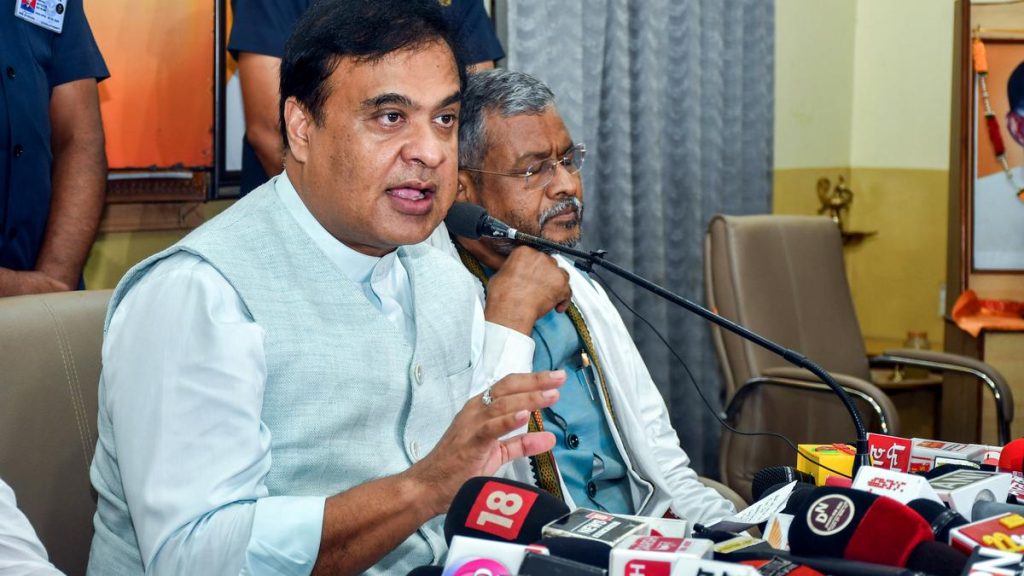Context:
Recently, the Assam government announced that it will implement 52 recommendations of the Justice Biplab Sarma committee on Clause 6 of the Assam Accord.
More on the news:
- Assam CM announced that 15 major recommendations will not be implemented for now, as they necessitate constitutional amendments.
- It was also announced that the 52 recommendations are mostly safeguards related to the language and land rights of the indigenous people.
About the Biplab Sarma committee:
- In July 2019, a 14-member committee was formed by the Union Home Ministry, chaired by retired Assam High Court Justice Biplab Kumar Sarma.
- The committee included judges, retired bureaucrats, writers, AASU leaders, and journalists.
- The purpose of the Committee was to suggest ways to implement Clause 6, particularly defining “the Assamese people” as eligible for ‘safeguards’.
- The Clause 6 of the Assam Accord states that appropriate constitutional, legislative and administrative safeguards will be provided to protect the cultural, social and linguistic identity and heritage of the Assamese people.
- The committee finalised its report in February 2020. However, Instead of being submitted to the Union Home Ministry, which had formed the committee, it was received by the then Assam Chief Minister Sarbananda Sonowal.
- In August 2020, four committee members released the confidential report in the public domain.
Assam Accord:
- The Assam Accord was signed on 15th August, 1985 amongst Union of India, Govt. of Assam, All Assam Student Union (AASU), and All Assam Gana Sangram Parishad.
- The accord ended the six-year-long agitation in Assam against the entry of Bangladeshi migrants into the state.
- For recognition as citizens, the Accord sets March 24, 1971 as the cutoff.
- It determined 1st January 1966 as the cut-off date for the purpose of detection and deletion of foreigners and allowed for citizenship for all persons coming to Assam from “Specified Territory” before the cut-off date.
- To implement the various Clauses of Assam Accord a new Department has been established in the name of “Implementation of Assam Accord Department” during the year 1986.
- As per clause 15 of the Assam Accord the Ministry of Home Affairs is the nodal Ministry for the implementation of the various clauses of Assam Accord.
Key Recommendations of the report:
Definition of “Assamese people” should include:
- Indigenous Tribals
- Other Indigenous Communities of Assam
- Indian citizens residing in Assam before January 1, 1951, and their descendants
- Indigenous Assamese people
- Based on the above criteria, the committee made several recommendations for reservations for “Assamese people”, including in Parliament, the state Assembly, local bodies, and jobs.
The 67 recommendations are divided into three categories: –
- 40 under state government jurisdiction;
- 12 requiring central government approval;
- 15 under central government jurisdiction.
- The state government aims to implement the 52 recommendations in the first two categories by April 2025. A roadmap will be submitted to AASU by October 25 this year.
Categorisation of Key recommendations: –
Land related:
- Establish Revenue Circles where only “Assamese people” can own and transfer land.
- Initiate a three-year program to allot land titles to long-term occupiers without documents.
- Conduct a special survey of char areas (Riverine areas of Brahmaputra), treating newly created chars as government land, prioritizing those affected by river erosion.
Language:
- Maintain Assamese as the official language statewide, with provisions for local languages in specific areas.
- Mandate all state government documents to be issued in Assamese and English.
- Form an Autonomous Language and Literature Academy to preserve indigenous languages.
- Make Assamese compulsory in English medium schools up to class VIII or X.
Cultural Heritage:
- Establish an autonomous authority for the development of sattras (Neo-Vaishnavite monasteries), providing financial support.
- Create multipurpose cultural complexes in each district to promote the cultural heritage of all ethnic groups.
Exemption areas:
- The autonomous councils in Assam’s Sixth Schedule Areas (e.g., Bodoland, North Cachar Hills, Karbi Anglong) will decide on implementing the 52 recommendations.
- The primarily Bengali-speaking Barak Valley will also be exempt from these recommendations.
Criticism regarding excluded recommendations:
- Some sensitive recommendations from the committee are not part of the 52 points presented by the state government.
- A proposal for an Inner Line Permit for entry into Assam, similar to those in Nagaland, Arunachal Pradesh, Manipur, and Mizoram, was not included.
- Reservations for “Assamese people”, including 80-100% of seats in Parliament, the state Assembly, and local bodies; 80-100% of Assam government jobs; and 70-100% of vacancies in Assam government-private sector undertakings.
- A recommendation to create an Upper House (Legislative Council of Assam) reserved entirely for “Assamese people” was also excluded.
- Concerns have also been raised regarding the central government’s involvement and whether the Union home ministry has accepted this report.

